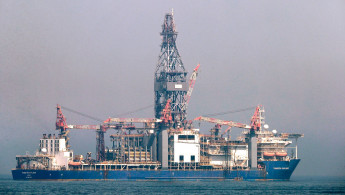Lebanon, Israel to hold indirect talks on border disputes after US-brokered deal
The two sides will hold their first maritime dispute talks in 30 years.
2 min read
Israel and Lebanon are still technically at war [Getty]
Lebanon will hold indirect talks with Israel over land and maritime border disputes following multiple failed attempts, Lebanese House Speaker Nabih Berri announced on Thursday.
The talks, which will be the first of their kind between the two sides in 30 years, come on the heels of normalisation deals between Israel and two Arab states.
There have also been murmurings about reconciliation between Israel and Lebanon for several weeks.
Israel and Lebanon are still technically at war, with multiple attempts to get them to the negotiating table having failed.
In early August, Berri told Lebanese newspaper Annahar that discussions with Washington over drawing the maritime border with Israel were "at their conclusion".
The newly-announced talks will be mediated by the US and hosted by the Office of the UN Special Coordinator for Lebanon (UNSCOL).
The issue of the shared maritime border is sensitive, mainly because of a dispute over coastal drilling rights.
In February 2018, Lebanon signed its first contract for offshore drilling in two blocks in the Mediterranean for oil and gas with a consortium comprising energy giants Total, ENI and Novatek.
Lebanon in April said initial drilling in Block 4 had shown traces of gas but no commercially viable reserves.
Exploration of Block 9 has not started and is much more controversial as Israel also claims ownership over part of it.
Israel and Lebanon each claim about 860 square kilometers (330 square miles) of the Mediterranean Sea as within their own exclusive economic zones.
Both are hoping to explore and develop new gas fields in the Mediterranean following a number of big finds in recent years.
Lebanon, which is mired in a severe economic crisis and is reeling from an explosion in Beirut which tore the city apart, is especially keen to develop offshore energy resources.
The Trump administration is likely to celebrate any direct talks as another diplomatic breakthrough in the Middle East.
The talks, which will be the first of their kind between the two sides in 30 years, come on the heels of normalisation deals between Israel and two Arab states.
"This is a framework agreement and not a final one," Berri told reporters while holding a copy of the September 22 framework agreement.
"The United States was asked by both sides, Israel and Lebanon, to act as a mediator and facilitator to draw up the maritime borders, and it is ready to do this," he added.
Following the United Arab Emirates and Bahrain's normalisation deals with Israel earlier this month, several Arab states including Oman and Sudan are reportedly eyeing similar accords.There have also been murmurings about reconciliation between Israel and Lebanon for several weeks.
|
In early August, Berri told Lebanese newspaper Annahar that discussions with Washington over drawing the maritime border with Israel were "at their conclusion".
The newly-announced talks will be mediated by the US and hosted by the Office of the UN Special Coordinator for Lebanon (UNSCOL).
The issue of the shared maritime border is sensitive, mainly because of a dispute over coastal drilling rights.
In February 2018, Lebanon signed its first contract for offshore drilling in two blocks in the Mediterranean for oil and gas with a consortium comprising energy giants Total, ENI and Novatek.
Lebanon in April said initial drilling in Block 4 had shown traces of gas but no commercially viable reserves.
Exploration of Block 9 has not started and is much more controversial as Israel also claims ownership over part of it.
Israel and Lebanon each claim about 860 square kilometers (330 square miles) of the Mediterranean Sea as within their own exclusive economic zones.
Both are hoping to explore and develop new gas fields in the Mediterranean following a number of big finds in recent years.
Lebanon, which is mired in a severe economic crisis and is reeling from an explosion in Beirut which tore the city apart, is especially keen to develop offshore energy resources.
The Trump administration is likely to celebrate any direct talks as another diplomatic breakthrough in the Middle East.
Follow us on Facebook, Twitter and Instagram to stay connected





 Follow the Middle East's top stories in English at The New Arab on Google News
Follow the Middle East's top stories in English at The New Arab on Google News
![Both Hamas and the Palestinian Authority welcomed the ICC arrest warrants [Getty]](/sites/default/files/styles/image_330x185/public/2024-11/GettyImages-2178351173.jpg?h=199d8c1f&itok=TV858iVg)

